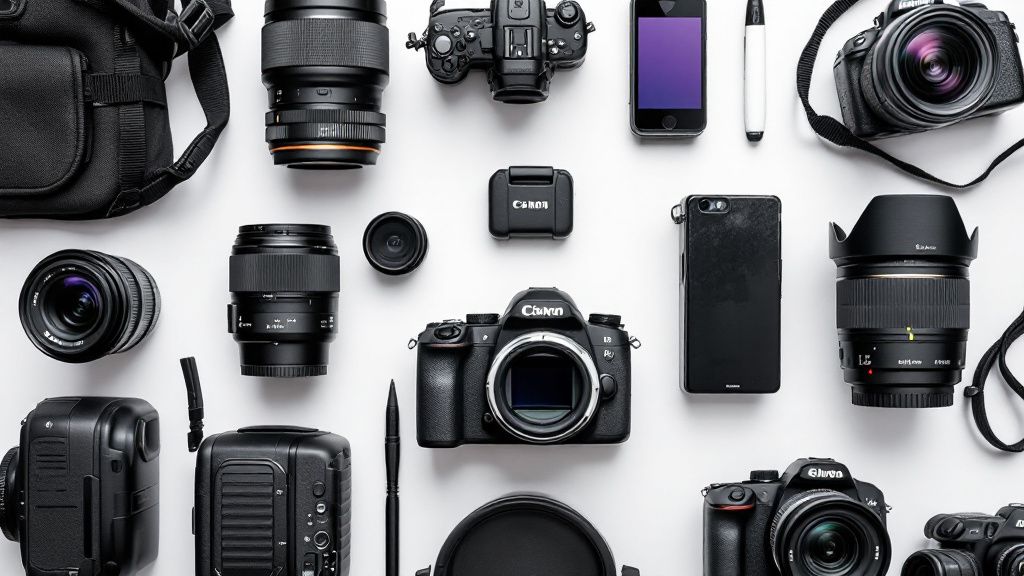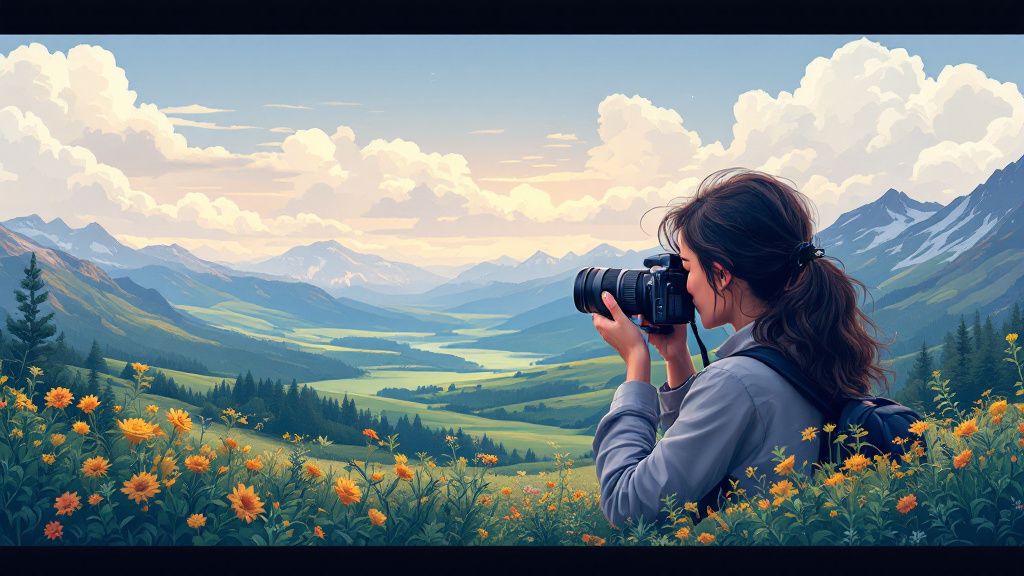Diving into the world of photography offers a vibrant and rewarding career path, where creativity meets technical skill. You find yourself capturing countless moments that tell unique stories, whether you are engaged in professional photography or exploring the realm as a freelance photographer. This career in photography is not only about taking pictures but also about continuously refining your craft through photography workshops and other learning opportunities. It’s a field rich with diversity, allowing you to photograph everything from breathtaking landscapes to candid human emotions. By embracing this dynamic career, you become a visual storyteller, immortalizing the world one frame at a time.

Discovering Passion in Photography
Developing a deep passion for photography often starts with a single click of the camera, capturing a moment that speaks volumes. You gradually transition from snapping casual pictures to seeking to capture the essence of a scene. Photography becomes an extension of how you view the world, allowing you to document the intricate beauty and diversity of life. This passion fuels your journey, ultimately steering you toward a career in photography.
One of the most exciting aspects of this career is the freedom to choose your path, whether it be professional photography with structured projects and clients or pursuing a more flexible route as a freelance photographer. For instance, many start by photographing local events or collaborating with small businesses. This hands-on experience helps refine your skills, turning your passion into a viable career option.
Immersing yourself in photography workshops can further ignite your zeal for the craft. These workshops provide valuable opportunities to learn from seasoned professionals while engaging with like-minded peers who share your enthusiasm. The techniques and insights gained can be pivotal in honing your style and building a robust portfolio that showcases your unique perspective.
It’s also crucial to continuously challenge yourself by experimenting with different photography styles and subjects. Whether it’s portraiture, nature, or abstract photography, each genre offers a distinct way to express your creativity. Your passion matures as you explore these various avenues, enriching your understanding of the medium’s potential.
Pursuing a career in photography is a journey of perpetual discovery, where your enduring passion becomes a driving force. As your skills evolve, so does your ability to communicate powerful stories through images, leaving a lasting impact on those who view your work. This ongoing exploration ensures that the love for photography remains vibrant and ever-growing.

Educational Pathways to Becoming a Photographer
Navigating the educational pathways to becoming a photographer offers a rich blend of formal education and practical experience. Pursuing a degree in photography or visual arts from a college or university provides a solid foundation in technical skills and artistic principles. These programs often cover topics such as lighting, composition, and digital imaging, essential for building a career in professional photography.
For those who prefer a more flexible learning experience, enrolling in photography workshops or online courses can be invaluable. These specialized programs allow you to focus on specific areas of interest, whether you’re looking to refine your technique or explore new creative styles. Aspiring freelance photographers can particularly benefit from these programs, gaining insights that quickly translate into practice.
In the future, the accessibility and diversity of educational resources for photographers are likely to expand significantly. With the rise of virtual learning platforms, you’ll have even more opportunities to learn from international experts without geographical constraints. This evolution in education will make it easier for you to continuously adapt to the changing demands of a photography career.
In any educational path, building a robust portfolio is crucial for demonstrating your capabilities and style. It’s essential to showcase your development and versatility to potential clients or employers, whether through personal projects or collaborations. This portfolio becomes your visual resume, communicating your unique vision and commitment to your craft.

Essential Equipment for Aspiring Photographers
Equipping yourself with the right tools is crucial for any aspiring photographer looking to build a career in photography. A versatile camera is at the heart of any photography kit. Whether you choose a DSLR, mirrorless, or a point-and-shoot camera, it should provide the ability to capture sharp, detailed images. Your choice often depends on your specific interests, be it professional photography or freelance projects.
Quality lenses are equally vital in expanding your creative possibilities. A selection of lenses, from wide-angle to telephoto, allows you to adapt to various shooting conditions and styles. For example, portraiture may require a prime lens for its ability to produce stunning bokeh effects. According to recent studies, the lens glass quality affects image resolution markedly, underscoring the importance of investing in good optics.
You’ll also need a tripod for stability, especially in low-light settings or during long exposures. This piece of equipment ensures that your images remain crisp and clear, even under challenging conditions. Keeping a sturdy yet portable tripod handy is essential for both studio work and on-location shoots.
In addition to cameras and lenses, post-processing tools like photo editing software are pivotal. These programs enable you to enhance your images, correct imperfections, and bring your creative vision to life. Mastering such software is an integral part of modern photography, whether you are attending photography workshops or self-learning through practice.

Entrepreneurial Skills for Photographers
To thrive in photography as a career, developing entrepreneurial skills is just as crucial as honing your artistic abilities. Understanding business fundamentals such as marketing, financial management, and client communication forms the backbone of your success. Mastering these skills allows you to effectively promote your services, manage your finances, and foster lasting relationships with clients, all essential components of both professional and freelance photography.
Project management is another important aspect, ensuring that you can handle multiple assignments, meet deadlines, and deliver consistent quality. The current state of the photography industry shows a growing trend towards digital marketing platforms and social media as primary tools for attracting clients. Leveraging these platforms enables you to showcase your work more broadly and connect with a target audience that appreciates your style.
Networking is a vital skill in expanding your reach and opportunities. Participating in photography workshops and industry events helps you connect with fellow photographers and potential clients. Building a strong professional network opens doors to collaborations and unique projects that can elevate your photography career. This interconnectedness is increasingly essential, as the industry evolves to value dynamic and versatile professionals.

Building a Photography Portfolio
Creating a strong photography portfolio is essential for showcasing your talent and attracting potential clients or employers. Your portfolio should highlight your versatility and technical prowess across different photographic styles. Whether you aspire to work in professional photography or as a freelance photographer, curating a collection that reflects your unique vision and the breadth of your skills is crucial.
On one hand, some argue that maintaining an online portfolio is the most effective way to reach a broad audience, as it offers accessibility and easy updates. On the other hand, others believe a physical portfolio conveys a sense of professionalism and personal touch, particularly in face-to-face meetings. Both perspectives offer valuable insights, suggesting the importance of balancing both digital and physical presentations.
Participating in photography workshops can significantly enhance your portfolio. These experiences enable you to experiment with new techniques and subjects, expanding your creative horizons. Furthermore, the feedback from peers and mentors can be instrumental in refining your work and providing direction. Integrating these diverse elements into your portfolio can make it more dynamic and appealing to those reviewing it.

Leveraging Social Media for Exposure
Utilizing social media as a tool for exposure is crucial for anyone pursuing a career in photography. Platforms like Instagram, Facebook, and Pinterest are not just galleries for showcasing your work; they are dynamic spaces for building a personal brand and engaging with a global audience. This virtual presence can significantly elevate your status within the professional photography community and open doors to new opportunities.
Think of social media as a digital showcase for your portfolio. Just like a storefront displays its best items to entice passersby, your social channels allow you to present your finest images to captivate potential clients and followers. This showcase works because it provides instant visual gratification and encourages interaction through likes, comments, and shares.
For freelance photographers, social media can act as a lifeline to attract both local and international clients. Sharing behind-the-scenes content and personal stories not only humanizes your brand but also builds a connection with your audience. Participating in online photography workshops can also provide material to share, keeping your content fresh and informative.
Building a consistent posting schedule ensures that you remain visible and relevant online. Engaging with fellow photographers, participating in hashtag challenges, and joining photography communities are all ways to increase exposure. The dynamic nature of social media not only amplifies your work but also keeps you connected to the pulse of the photography industry.



